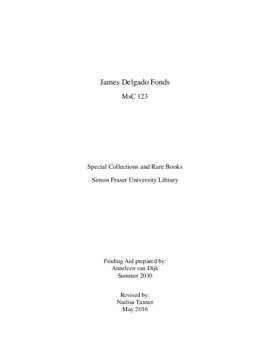[Camp nominal rolls, correspondence and other records]
- MSC-140-0-0-0-0-6
- File
- 3 Apr.1942-22 Jan. 1943
File consists of nominal rolls, correspondence, lists, bills of lading and other records, mainly of W.J. Wishart, Supervising Foreman at Red Pass, with a few letters addressed to R.M. Corning, Assistant Engineer, Blue River and Resident Engineer, Red Pass. The file includes records pertaining to road camps at Yellowhead, Lucerne, Rainbow, Tete Jaune, Red Pass, Grantbrook, and Albreda.
The file contains nominal rolls, also called personnel lists, for Japanese Canadian road camp workers (“Japanese Nationals”) at Grantbrook Camp 5, Rainbow Camp 6, Tete Jaune Camp B12, and Lucerne Camp 2. Information listed in these documents includes some or all of the following: last name, first name or initial, registration number, camp occupation, marital status and number of dependents. The file also includes a list of Japanese Nationals to be transferred from Albreda to Red Sands camp, with the following information: car number, registration number, first and last names, pre-evacuation occupation, and marital status.
Amongst the correspondence in the file is a letter from Chief Engineer T.S. Mills to Corning advising him that staff should be aware of “not divulging either orally or in personal correspondence any confidential information regarding any project or work which has resulted from Canada at war” that might be used by enemy agents, and a telegram to a Japanese Canadian camp worker from his wife advising him of the acquisition of a sugar beet contract and the sale of a Japanese Canadian house. The file also contains correspondence pertaining to the medical treatment of Japanese Canadian road camp workers and the hiring of a first aid attendant, as well as lists, bills of lading and correspondence pertaining to equipment and supplies, in particular groceries, required for various camps.
Several letters within the file concern perceived agitation, organization, demands and complaints amongst the Japanese Canadian road camp workers. These include an April 24, 1942 letter from Wishart to J.H. Mitchell, Senior Assistant Engineer, Jasper, regarding Lucerne camp workers’ refusal to work in protest of the planned removal from camp of seven men identified as “agitators”; a May 1, 1942 letter from Wishart to Mitchell concerning the organization of Albreda camp workers and their refusal to work in protest of the planned transfer of thirty men to Red Sands and numerous conditions at camp that they felt to be unsatisfactory, the resolution of these issues, and plans to quickly identify and “discipline” any future “trouble makers”; as well as an October 6, 1942 letter from Supervising Engineer C.M. Walker in Banff to Corning at Red Pass regarding workers’ demands at Thunder River camp and possible methods of dealing with potential strike action.

